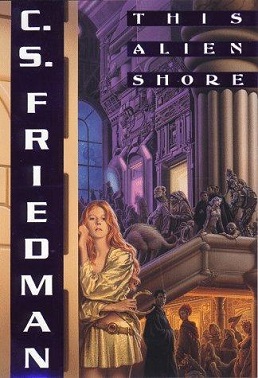Books like This Alien Shore
This Alien Shore
TL;DR version: The bastard love-child of Dune and Neuromancer, but the awesome kind of bastard-child, the one that ends up forging his own destiny and writing his name in the stars.Longer version:I read this book as a teenager, and was deeply affected by it. Later, I read it as an adult, as was not-quite-so impressed anymore, but C.S. Friedman's world had sunk its claws into my mind, deep: the idea of Code as poetry, as art, became a bit of an obsession with me.If this review is vague and lacking in some specific details, it's mostly because I think other reviewers have discussed the plot and the characters -- book's been out for a while, after all -- and I think my contribution needs to be centered around my personal experience. For everything else, there's google.I read this again today. And the critiques of it--from my early twenties--withered and died till only one of them was left. This Alien Shore is one of the most beautiful implementations of starfairing humanity I've seen. The Guild is a hybrid of the Bene Gesserit and the Navigator's Guild of Dune, with politics and powerplays and complexity, but ultimately an entirely *ethical* worldview and objective. It's Dune without the soul-twisting. And the treatment of FTL...the anniq, the dragons...it will leave readers breathless. Without ever truly *talking* about it, the entire novel expresses and uplifts the hunger for starflight, the hunger to extend the threshold of our reach as individuals and as a species.The plot has two threads--one follows a young girl, a repository of great and unknown secrets, on the run from Earth and its corporations. The other is Lucifer: a virus that is wrecking havoc on the Guild's navigators, threatening the foundations of mankind's salvation--FTL travel through the rifts of space that bind all the worlds together.The computer/bioware aspects of this have many neuromancer-like components, but without the dystopian grit.The characters are true--true to themselves, if not to our expectations of them--they are individuals, deeply meaningful, their lives and hopes and dreams and fears sketched out in vibrant 3D. Relationships-professional, romantic, adversarial-all are true to their function and form, and heartbreaking in some cases, liberating in others.The complaints of my early-twenties were plot-related - that the pacing was off, certain scenes went on too long, others were not in the right places. This remains a mild criticism, tempered by the realization that back then I was young and impatient, and wanted to get to the "good bits". As a writer, I slowed down, appreciated the prose, the development, the subtle-but-necessary touches that made everything more. The one criticism that remains is that while the two plot-threads deepened and strengthened each others' themes, ultimately their intersection was not one of mutual resolution but of mutual understanding. That is...not a bad thing. But it doesn't bring the story full-circle in terms of action. The fear-and-threat felt so viscerally by the MC is not vindicated in a quite-satisfying way. Minus one star. But since this is getting graded on a 6-star scale, specially-made by me for the works that have influenced me so deeply, a full set of five stars remain.This is a beautiful novel, full of hope for the future. Humanity's discarded children rise above the pettiness-of-soul that characterizes so much of mankind's history. Deeply flawed individuals display nobility of spirit, and the diverse, the mad, the broken, make their way to where they truly belong--the stars.Read it. You'll be happy you did. And when you're done, perhaps you'll come to the same conclusion I did: We are all Variants, and Guera is our home.

